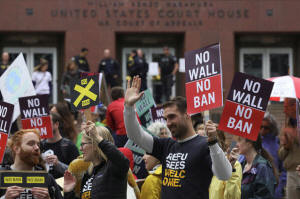|
In travel ban case, U.S. judges focus on
discrimination, Trump's powers
 Send a link to a friend
Send a link to a friend
 [May 16, 2017]
By Tom James [May 16, 2017]
By Tom James
SEATTLE (Reuters) - U.S. appeals court
judges on Monday questioned the lawyer defending President Donald
Trump's temporary travel ban about whether it discriminates against
Muslims and pressed challengers to explain why the court should not
defer to Trump's presidential powers to set the policy.
The three-judge 9th U.S. Circuit Court of Appeals panel was the second
court in a week to review Trump's directive banning people entering the
United States from six Muslim-majority countries.
Opponents - including the state of Hawaii and civil rights groups - say
that both Trump's first ban and later revised ban discriminate against
Muslims. The government argues that the text of the order does not
mention any specific religion and is needed to protect the country
against attacks.
In addressing the Justice Department at the hearing in Seattle, 9th
Circuit Judge Richard Paez pointed out that many of Trump's statements
about Muslims came "during the midst of a highly contentious (election)
campaign." He asked if that should be taken into account when deciding
how much weight they should be given in reviewing the travel ban's
constitutionality.

Neal Katyal, an attorney for Hawaii which is opposing the ban, said the
evidence goes beyond Trump's campaign statements.
"The government has not engaged in mass, dragnet exclusions in the past
50 years," Katyal said. "This is something new and unusual in which
you're saying this whole class of people, some of whom are dangerous, we
can ban them all."
The Justice Department argues Trump issued his order solely to protect
national security.
Outside the Seattle courtroom a group of protesters gathered carrying
signs with slogans including, "The ban is still racist" and "No ban, no
wall."
Paez asked if an executive order detaining Japanese-Americans during the
World War Two would pass muster under the government's current logic.
Acting U.S. Solicitor General Jeffrey Wall, arguing on behalf of the
Trump administration, said that the order from the 1940s, which is now
viewed as a low point in U.S. civil rights history, would not be
constitutional.
If Trump's executive order was the same as the one involving
Japanese-Americans, Wall said: "I wouldn't be standing here, and the
U.S. would not be defending it."
Judge Michael Daly Hawkins asked challengers to Trump's ban about the
wide latitude held by U.S. presidents to decide who can enter the
country.
"Why shouldn't we be deferential to what the president says?" Hawkins
said.
"That is the million dollar question," said Katyal. A reasonable person
would see Trump's statements as evidence of discriminatory intent,
Katyal said.
[to top of second column] |

People protest U.S. President Donald Trump's travel ban outside of
the U.S. Court of Appeals in Seattle, Washington, U.S. May 15, 2017.
REUTERS/David Ryder

In Washington, White House spokesman Sean Spicer said at a news
briefing that the executive order is "fully lawful and will be
upheld. We believe that."
The panel, made up entirely of judges appointed by Democratic former
President Bill Clinton, reviewed a Hawaii judge's ruling that
blocked parts of the Republican president's revised travel order.
LIKELY TO GO TO SUPREME COURT
The March order was Trump's second effort to craft travel
restrictions. The first, issued on Jan. 27, led to chaos and
protests at airports before it was blocked by courts. The second
order was intended to overcome the legal problems posed by the
original ban, but it was also suspended by judges before it could
take effect on March 16.
U.S. District Judge Derrick Watson in Hawaii blocked 90-day entry
restrictions on people from Libya, Iran, Somalia, Sudan, Syria and
Yemen, as well as part of the order that suspended entry of refugee
applicants for 120 days.
As part of that ruling, Watson cited Trump's campaign statements on
Muslims as evidence that his executive order was discriminatory. The
9th Circuit previously blocked Trump's first executive order.
Last week the 4th U.S. Circuit Court of Appeals in Virginia reviewed
a Maryland judge's ruling that blocked the 90-day entry
restrictions. That court is largely made up of Democrats, and the
judges' questioning appeared to break along partisan lines. A ruling
has not yet been released.

Trump's attempt to limit travel was one of his first major acts in
office. The fate of the ban is one indication of whether the
Republican can carry out his promises to be tough on immigration and
national security.
The U.S. Supreme Court is likely to be the ultimate decider, but the
high court is not expected to take up the issue for several months.
(Additional reporting by Roberta Rampton in Washington)
[© 2017 Thomson Reuters. All rights
reserved.]
Copyright 2017 Reuters. All rights reserved. This material may not be published,
broadcast, rewritten or redistributed. |